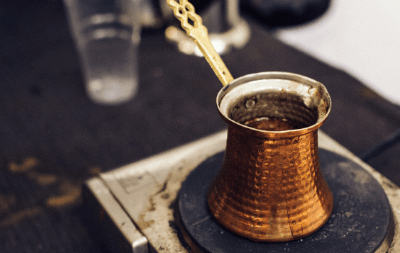
Lately, I have been enjoying making both Turkish coffee in my new Ibrik and regular drip coffee. It made me wonder if there was a significant difference between the strength of these two styles of coffee. I did some research and here’s what I discovered.
Is Turkish coffee stronger than regular coffee? Yes, Turkish coffee is typically stronger than regular coffee due to its longer extraction time, more finely ground beans and use of 100% arabica beans. However, there are several factors that might cause regular coffee to have more caffeine.
Here is a more detailed explanation of why Turkish coffee is usually stronger. Also, some examples of when regular coffee might be a little stronger.
Finely ground Turkish coffee beans produce stronger coffee
Turkish coffee famously uses ultra-fine coffee grounds that have a higher extraction rate than pretty much any other coffee style. This means that the grounds extract flavor into the beverage at a quicker rate.
Therefore, the caffeine content and bold coffee flavors will also be injected into the beverage more quickly as well.
How do fine grounds produce a stronger coffee?
It has to do with the surface area of the finely ground beans. The smaller a coffee bean is ground, the greater its surface area will be. This allows it to have more contact with the water, which causes it to dissolve more quickly.
Pretty much every other style of coffee uses more coarsely ground beans, which means they have a lower rate of extraction compared to Turkish coffee. This includes espresso, which is also known for its fine grind density.
This is the main reason Turkish coffee would have both a stronger caffeine content and bolder taste.
Turkish coffee is stronger due to a longer extraction period
Turkish coffee also extracts more flavor and caffeine because it takes longer to brew. Typically, Turkish coffee grounds will brew for 8 minutes or more, while regular drip coffee will brew for around 5 minutes.
The longer brew duration allows the coffee grounds to extract for longer, which increases the amount of caffeine and other organic compounds that end up in the coffee.
Turkish coffee strength can be difficult to measure
The caveat with Turkish coffee extraction is that the water is not at its peak brewing temperature for the entire duration of a Turkish brew. It starts at room temperature and gradually heats up over time.
The hotter the water temperature is, the more quickly coffee grounds will dissolve into it. Most coffee brewing methods call for an accurate water temperature and brew duration. This makes it easier to measure a particular method’s extraction rate.
But with Turkish coffee, the total amount of extraction may vary depending on how quickly one’s stove top heats up and how long it takes for the Ibrik to finish brewing.
This makes it difficult to know exactly what a Turkish coffee’s strength is because it varies from one person to the next depending on their equipment.
Turkish coffee continues to strengthen after you start drinking it
After the coffee is finished brewing, the grounds are poured into a mug with the coffee, sugar and cardamom. Once here, the grounds will continue to extract until you take your last sip. This prolonged extraction period adds to the strength of Tuskish coffee.
When might regular coffee be stronger than Turkish coffee?
As you can see, there are many reasons why Turkish coffee is often stronger than regular coffee. But there are some circumstances that might cause regular coffee to be a bit stronger.
Turkish coffee uses arabica beans which have a lower-caffeine content
Turkish coffee can be made using any type of coffee bean. But traditional Turkish coffee is made using 100% arabica beans.
Arabica beans have a caffeine content of about 1.5%, whereas robusta beans have a caffeine content of 2.7%. This means that coffee that’s made using robusta beans could in fact have a stronger caffeine content after all.
Turkish coffee uses darker roast beans which are lower in caffeine
Further to the point above, Turkish coffee is typically made using dark roast beans which have a lower caffeine content than light roast beans.
The difference in caffeine content between light and dark roast beans is smaller than the amount between arabica and robusta. But it’s possible that a light roast bean could contribute to a regular coffee being stronger than a Turkish coffee.



